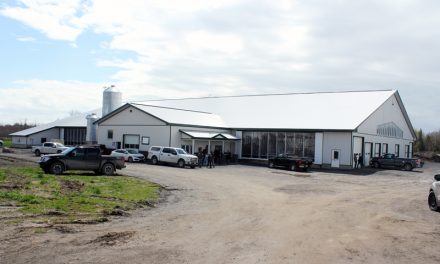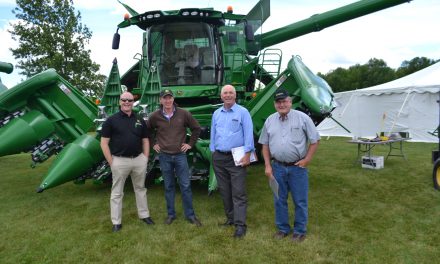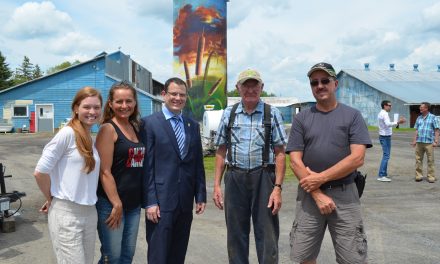SOUTH DUNDAS – Each year, the Innovative Farmers Association of Ontario (IFAO) chooses one farmer whose dedication to soil health, environmental stewardship and progressive production makes them stand out from the crowd. At this year’s conference in London, Ont., Warren Schneckenburger will receive the Innovator of the Year Award for 2019.
Alongside his parents Arden and Rhonda Schneckenburger, Warren and his wife operate Cedar Lodge Farms, a cash crop farm with a small beef feedlot outside of Morrisburg, Ont. Schneckenburger is the third generation on the farm. His grandparents, Martin and Evelyn, purchased it in 1954 after emigrating from Germany. Today, the farm’s main crops are corn, soybeans, winter wheat and edible beans.
Much has changed on the farm in the last 10 years, said Schneckenburger. The moldboard plow, for instance, was the main fall tillage tool for 100 per cent of the corn and about half the soybeans.
“Corn-on-corn covered about 65 per cent of the farm, with soybeans only grown on the well-drained and reasonably stone-free soils,” Schneckenburger explained.
But in 2008, no-till soybeans began to take away a lot of tillage. “Of course, today we look at that as planting soybeans without tillage and not no-till,” he said.
In 2011, a pivotal trip to the National No-Till Conference in Cincinnati, Ohio with the Innovative Farmers Association inspired much change on the farm.
“A photo in a slideshow by Joel Gruver of strip-tilling into a lush green field of annual ryegrass set in motion a decade of change for our operation,” said Schneckenburger. “And I’m certain it isn’t over yet.”
Following the conference, Schneckenburger made the decision to permanently park the plow, switching it out for a disk ripper instead, and began implementing more soil-friendly practices, such as improved rotation, strip tillage, controlled traffic farming (CTF) and cover crops.
“A real effort to stop all tillage ahead of soybeans was made and building soil structure became a real goal for our farm,” said Schneckenburger.
In 2012, Schneckenburger began experimenting with cover crops, devoting acres of land to research. Today, his primary focus is on interseeding cereal rye into corn ahead of soybeans in fall. While he believes wheat offers an amazing opportunity to play with cover crop cocktails, wheat isn’t a major crop in eastern Ontario, making opportunities hard to come by.
“It is an awesome feeling to have over 1,000 acres of cereal rye ‘growing’ in droughty conditions under corn stalks, and record acres of winter wheat for our farm,” said Schneckenburger. “We are also already at 80 per cent of our corn ground strip tilled.”
“10 years ago we would have mudded off a big portion of our corn so we could get the plowing done,” he said, adding that the thought now puts shivers down his spine.
Today, Schneckenburger’s real focus is on soil health and compaction mitigation, not yield. But his efforts are being rewarded. “Our clay soil compacts easily, and often November turns very wet quickly,” he explained. “Tracks have become the major player on the farm. Most tillage, planting and harvest is now done on belts, some in controlled traffic, some not.”
Schneckenburger believes that the biggest contributor to compaction on his farm is the sprayer, which is why it now runs on dedicated CTF trams to mitigate its impact. Where tracks can’t be used, he employs VF tires.
“We swap tracks from 25” to 18”, depending on the application needed, as well as swapping wide 710 tires for narrower tires on tractors and the sprayer, depending on the time of year,” he explained. “I think some inflation control is in the future for the sprayer, but that trigger hasn’t been pulled yet.”
Ultimately, his 10-year goal is to be 100 per cent no-till, a move that will cost significant investment in drainage. Strip tillage, he said, will be a great crutch in the transition.
“We have had success with no-till and high residue farming on undrained soil, but more often than not failures on those saturated fields,” said Schneckenburger. “Drainage is key in my opinion.”
“It is amazing how quickly the soils change, and from my mentors’ anecdotes I’m reasonably confident that within the 10-year timeline we’ll maintain – if not increase – corn yields during the transition,” he concluded.
IFAO will be celebrating Schneckenburger’s efforts at the IFAO Conference Feb. 20 to 21, at the Best Western Lamplighter Inn in London.













